Gaza: Relieving the minds of a trapped society
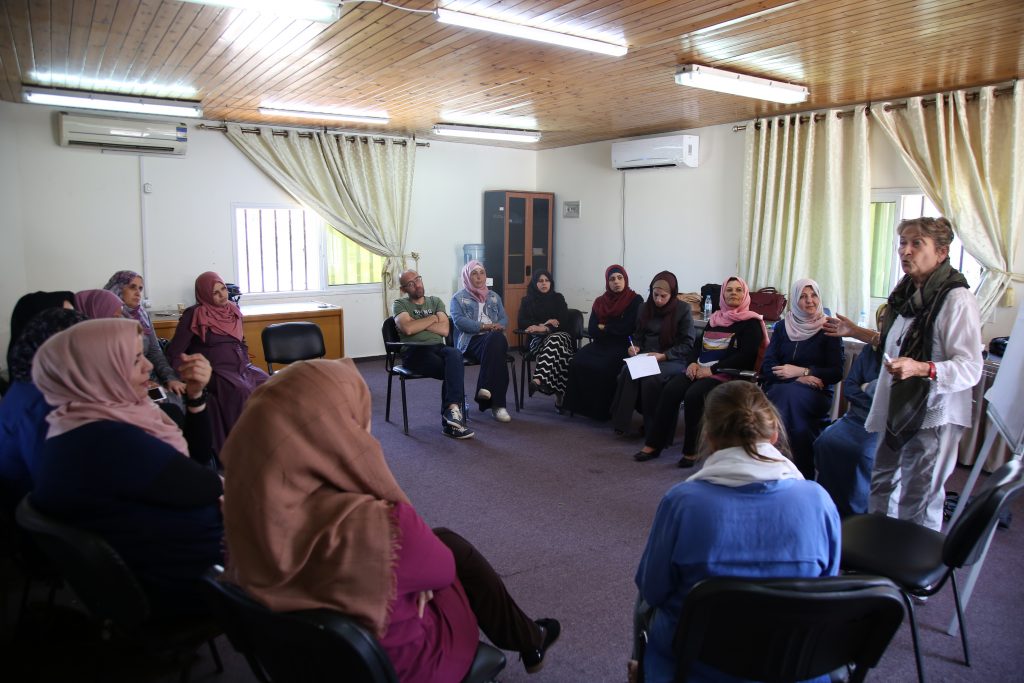
- Experiences of the psychoanalyst and psychodramatist Ursula Hauser in 2004, after six years of work in Gaza, Palestine. She applied and taught her psychodrama method as therapy for the people.
In August 2004, I interviewed the Swiss psychoanalyst and psychodramatist Ursula Hauser about the Israeli-Palestine conflict. She had residence in both San José, Costa Rica and Zurich, Switzerland. At that time, difficulties to access the conflict zone was a commonplace. Due to her humanitarian work with “medico international”, she had access to the area and could bear witness to what was happening.
We held the conversation in her Training Center in Psychoanalysis called “Itari,” an indigenous word meaning “where the winds are born and where they encounter” in Náhuatl. This center is closely linked to its functions in different universities such as the University of Costa Rica (UCR) and the Independent University, a private institution.
With a vast international working experience in Cuba, Nicaragua, Bolivia, El Salvador, Uruguay, México and Palestine, Hauser holds a PhD in Psychology from the University of Klagenfurt, Austria and a Bachelor from the University of Zurich. During the Cold War, she helped South American exiles and learned from them about the Latin-American reality. “Chileans and Argentinians were our teachers, due to their sad realities. I learned a lot from their experience.”
Currently, she is promoting psychodrama projects in different parts of the world through a foundation registered in his name.
“When we ask in the group, -what animal would you like to be?-, totally in a fantasy world, of course! Everyone wants to be birds. It represents freedom. Let’s be birds!”
What is your personal experience in Gaza?
If I hadn’t worked in El Salvador, if I hadn’t gone to Nicaragua, if I hadn’t been with my Uruguayan partner who was tortured and if I hadn’t had a militant political compromise, I would have never gone to Gaza. It’s very heavy! If you’re not prepared, you can get scared. It’s like they say, a big jail. When you enter through the Erez checkpoint, images of concentration camps come to mind. It is very strong the impact of the Israeli militarization.
On a personal level, I had a political and intimate preparation in Latin America. I don’t panic easily. I have known the terrible economic poverty of refugee camps, where people are psychologically affected by terrible trauma. One sees children with hatred in their eyes, also towards us who come from outside.
The most important thing is that I don’t go alone. I would never go alone! These group jobs are a burdensome. You get depressed. I’m going with a Swiss colleague, Maja (Hess), with whom we also work in El Salvador. She is the current president of the non-governmental organization (NGO) that supports this work called “medico international”.
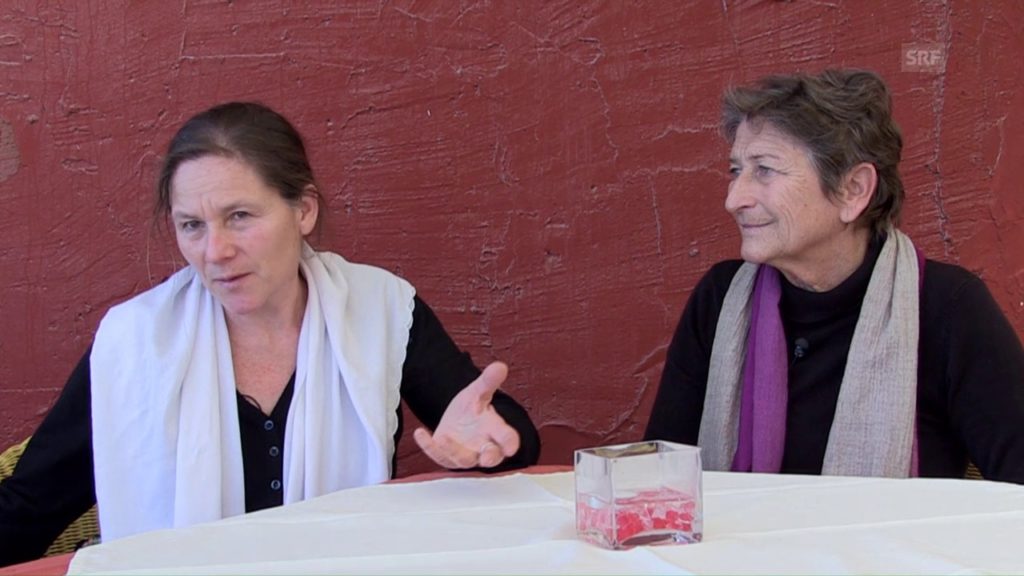
How was your humanitarian work in the Gaza Strip?
The first time I went to Palestine was in the year 1998. My partner Maja was before, in the first Intifada in the year 1989. She speaks Arabic and I don’t. We went together after receiving a request from people who wanted to learn the method we taught about psychodrama.
Culturally, we had to see first if the method was compatible with Islam since this is a system in which you play with your own body touching yourself. Women and men invert roles. I am not a specialist, but we know that their religion is very restrictive for women. They are severely punished, for example, if they look directly into the eyes of a man who is not her husband.
We went at first to Gaza, then to Bethlehem, Ramallah, Nablus and Jenin. We experienced with different groups to see if the method would work. It turned out great!
We have seen what we now systematize in Gaza. All this anger in the people and how they can resist this situation of total imbalance as the Intifada: Stones against tanks! On a psychological level, this condition of how to endure feelings of helplessness and humiliation, it is difficult. If ourselves feel headache, stomach and psychosomatization, you could imagine them who live there permanently.
For example, if someone says that it feels rage, I ask -How do you feel it?-. So, the person may discharge this rage with a bat or a stick against something to release the negative energy. What this means is that a person that keeps negative and aggressive energy towards oneself, could get sick and it’s a big danger. If suicide was not forbidden by Islam, we would surely have massive suicides because there is a lot of depression and psychosomatization.
In those six years, after experimenting and evaluating the method, it was their desire that we continue to teach them this therapy. We made the decision to do it in the Gaza Community Mental Health Programme (GCMHP), where Eyad El-Sarraj (1944−2013) is the director. This center is the only one in all of Palestine where psychologists, psychiatrists, nurses, among many other health professionals, can be trained.
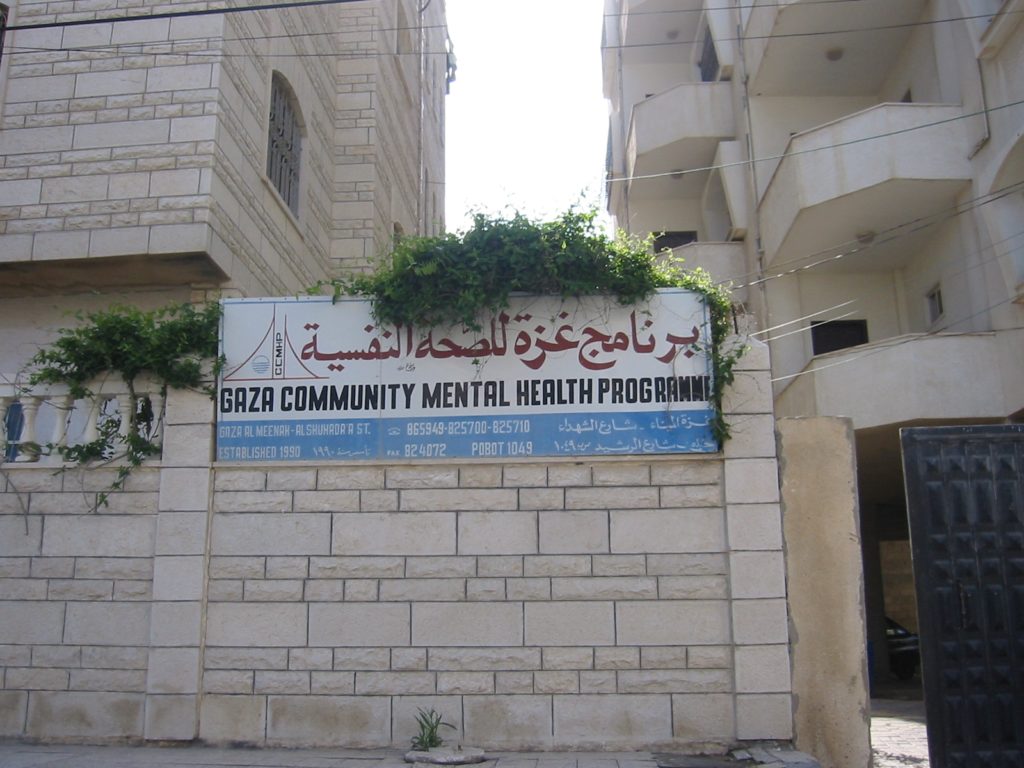
What exactly is psychodrama?
Psychodrama is a group method where participants express through gestures and acting a theatrical scene of their daily conflicts. It is an exercise of self-management that needs someone who listens and interprets the phenomena or events that are experienced in the group and that facilitates deepening. This methodology helps groups to develop their own dynamic so they can continue to work even without my presence. The main objective is to offer them a tool that can be used to overcome the traumas caused by the extreme violence and terror that they suffer in the place where they live.
You are one of the few people who have access to Gaza. There is strict control. Is it this situation real?
We have luck! Maja and I, don’t let them so easy to get rid of us. If they tell us that we cannot enter, we use our Swiss passports, we use our medical and psychoanalyst titles, humanitarian professions, and say that we do not go in a political mission. They have no reason or legitimacy to forbid the entrance. Many people from organizations like UNICEF and UNESCO are not allowed to enter and they wait in Jerusalem until they get the pass. This is a pure manifestation of power and this is what the Israelis are doing with this wall. It is to put fear in people’s heads so that they discard going to Gaza.
An advantage we have is that one of our colleagues in the NGO is Jewish and very critical of the Sharon government. He gave us access to the Israeli embassy in Switzerland and convinced them that -they have to let us in, that we are neither politicians, nor this, nor that.
Currently, no Jews can enter Gaza. Even a Jewish organization called “Doctors for Human Rights”, who have been working hard on the Strip and who are against Sharon, are not allowed in. They are around 2,000 people, mostly left-wing doctors, who now suffer tremendous persecution, and many have lost their jobs in institutions. Its founder is a medical woman named Ruchama Marton. In Europe there is a whole movement for her to be proposed for the Nobel Peace Prize.
Another important point, and that you mentioned, it is that they don’t let journalists to enter either. They don’t want information coming out of what’s going on. Nevertheless, there is the advantage of new technologies like the Internet and even the cell phones that I hate, and that serve a lot to counteract this situation.
How do the people you know deal with the situation in Gaza and in the camps?
It’s terrible, it’s a human catastrophe! Luckily, still we don’t have to talk about genocide, but it could come to that. It is a project of elimination at all levels. They steal their land and water, which is one of the serious problems of the conflict.
There are Jewish settlements, which are common throughout all the territory of Palestine. These must be seen as military fortresses. There, live the most fascist and radical people of Israel. For example, you know what these people do. The Palestinians have wells from which they draw water, so they steal and electrify them by surrounding with barbed wire. In the same way, it happens with the highways that they control the communication routes.
Another example we know are the women who are social workers. They labor in the refugee camps and come from Rafah, which is next to Egypt. The situation in this area is extreme and terrible. It was from this zone where the first Intifada began. Palestinians in that camp are the most radical ones. They believe that with weapons they will achieve something and unfortunately many young children want to be a martyr, because they see no future.
Imagine that to the present day they have almost nothing to eat. The problem of lack of water is serious too. For example, the United Nations trucks can no longer enter with their water and food. They were supposed to fulfil this commitment to supply the population with the minimum.
Many of the Refugee Camps are from 1948 and after 1967. It is the dramatic story of the Palestinian people. They were expelled and these poor people had nothing to do with the Holocaust.
About the Holocaust. Could we say that the Jews went from being victims to victimizers and that psychologically they have identified with those who were their oppressors?
At that point I am very prudent. I think that every phenomenon must be seen in its own historical context. The Holocaust made by the Nazis against the Jewish people is unique in its form, cruelty, anti-Semitic and racist ideology.
It seems to me that is better to explain today’s events highlighting the words of a Jewish Austrian writer named Erich Fried (1921-1988). He wrote that the utopia of the Jewish people was to be able to live in freedom. However, now they have become jailers themselves. They have imprisoned the Palestinians. There maybe we could see a change of role, an identification with their aggressor, without saying that they act like Nazis, because there is the sensible limit of anti-Semitism.
Unfortunately, at the moment, in terms of this “War on Terror” between the good and the bad, by a political opportunism to justify all kinds of actions, it looks complicated. They demonize as terrorists all the Arabs and Palestinians, something that is very serious.
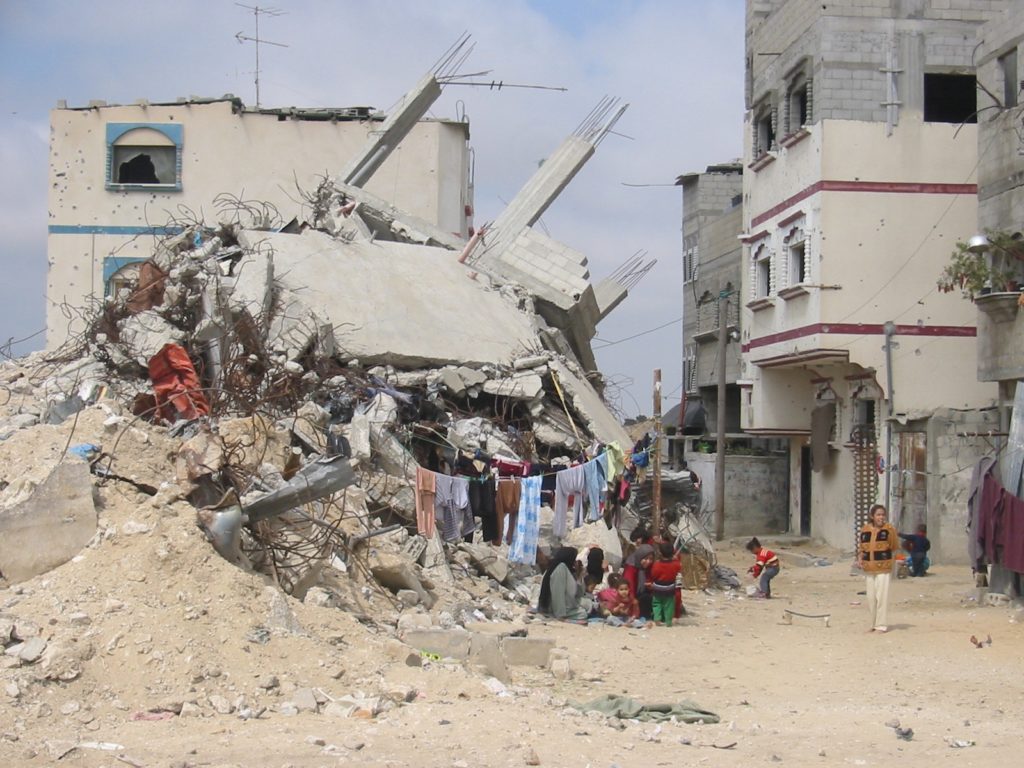
What meaning does the wall have psychologically and socially for the inhabitants of Palestine?
I remember when the Berlin Wall fell. Everyone was happy and jubilant in the Western world. For me, this wall is similar to the one on the U.S.-Mexico border, which is built because of the discrimination towards Mexicans. In this case, it is that of the Jews towards the Palestinian Arabs, because they are seen as inferior.
If you go from the West side of Jerusalem to the East side, social differences are evident and abysmal. They want to divide the city with this wall. Something that is very serious, since there are intermixed Jews, Christians and Arabs. On the top of this, it’s a historic city for humanity. If they built this barrier inside, they would destroy it.
In the Gaza Strip, we can see clean-up on both sides. Cleaning means destroying everything that obstructs the construction of the wall such as houses and apartments buildings where many Palestinians live. They become homeless. First, they throw some grenades to bring down the buildings, and then, they pass with the tanks and machinery. We haven’t been able to see it up close, because it’s dangerous.
This must be stopped. This wall wants to separate two worlds, where one is supposedly good and the other bad. Children on both sides grow identifying with this image that they want to impose on them. Palestinian children identify themselves as bad and poor. They do not see a future and they believe is better to become a martyr so that in heaven they will be rewarded.
Here is where our work is fundamental to counteract that image and open up a space for them to be setup as humans. You see little ones with a lot of hate reflected in their faces and eyes. Of course, all this madness has very serious psychological consequences. Nonetheless, these suffered and resilient people have an impressive and strong cultural identity. For example, amid the rubble left by tanks, the little they have to eat is shared. People sit in a circle. It is a collective structure of solidarity and assistance.
Gaza is a prison because they control the sea on one side, and on the other, they control the exit to Egypt. Numerous intellectuals can no longer leave. They are not allowed. They want to isolate them. Everything is already hermetically closed with these checkpoints of Erez and Rafah. Then, in the West Bank they are doing the same. Building a wall around this whole part that would be the Palestinian autonomous state, which is the old project. This is all like a dismembered body. There’s a wall around Nablus, all this is for greater control.
Are there several walls?
Yes, there are several.
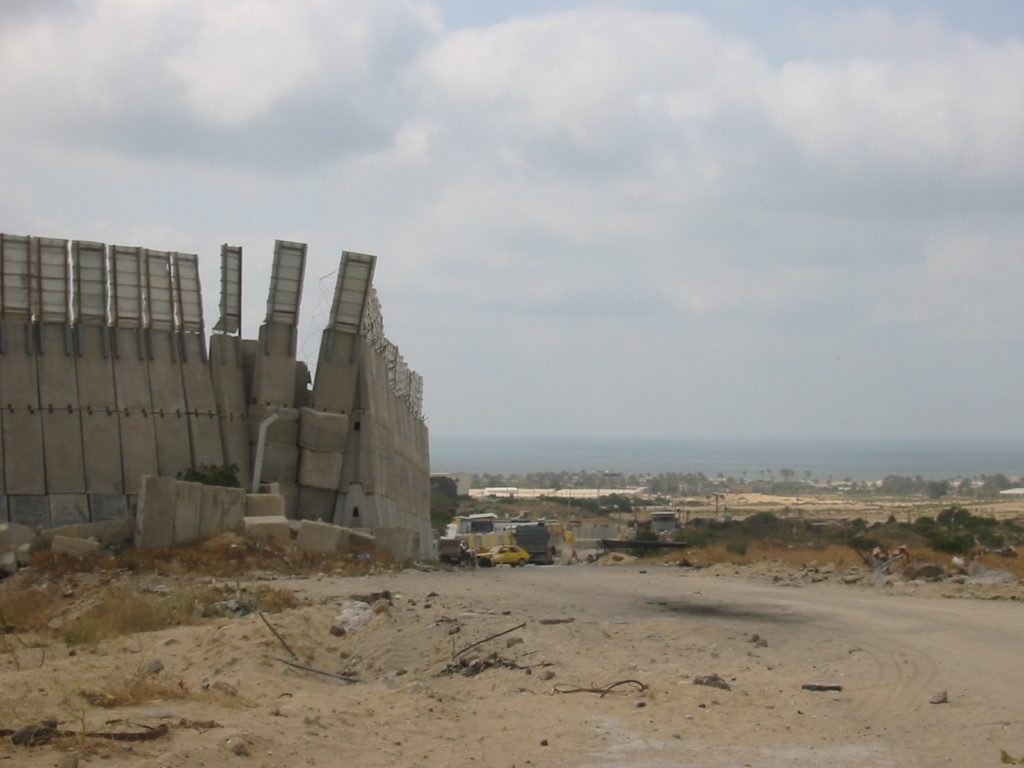
The International Court of The Hague and the Supreme Court of Israel have forbidden them to continue with this. Do you think they’re going to stop or will they keep building?
I’m sure, and in 10 days I’ll see, that they will still be building. It is like in the dictatorships of South America, like Pinochet in Chile. There may be laws, but they are never respected. They do whatever they want.
What do you think of Sharon’s proposal to withdraw settlements from Gaza?
I don’t think they’re going to withdraw. Sharon’s plan has met with much opposition in her own party, Likud. If they really do, they’re not going to leave anything consumable in those lands. They even have a project to take the water from the sea across the border with Egypt.
Regarding this issue, our colleagues said that if they withdrew, new conflicts would arise. For example, Egypt occupied this land before 1948. They are Arab brothers, and, unfortunately, we know that among brothers there is sometimes hatred if one has more power than the other.
Another problem would be the contradictions, conflicts and lawsuits within the Palestinian different political forces. The Palestinian Liberation Organization (PLO) has no authority in Gaza, yet Arafat managed to regain respect, because he did not go into exile.
I agree with Eyad al-Sarraj who was in jail for being against Arafat, that the way it is being led is not appropriate, there is much corruption. However, now with all this war of the second Intifada, and he resisting without leaving, he has gained more sympathy.
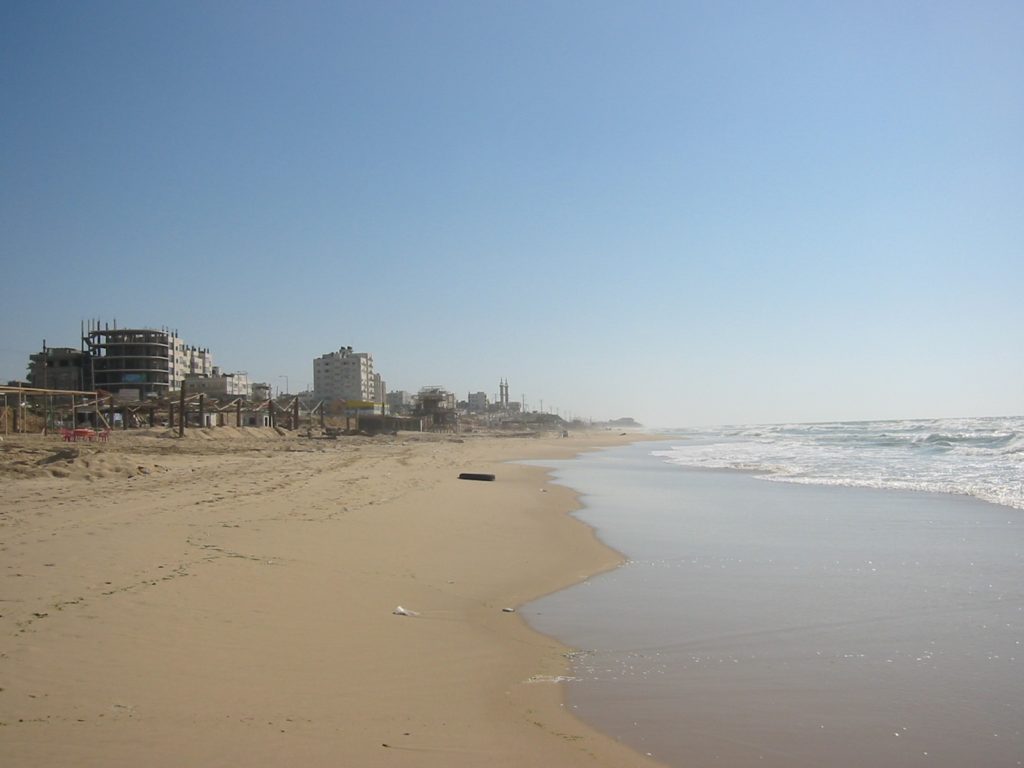
About this Israeli policy of the targeted assassinations of leaders that have particularly affected Hamas. Has this weakened the leadership of this group?
Fundamentalism is a terrible danger on all sides. Hamas does not have a vision of the future. They have training camps on the beaches. We sometimes go to walk to the beach at 6 am and there are the little ones training militarily. This group has money and schools and provide food to them.
Notice that it was the Israelis themselves who once financed this group. I do not know if the strategy of war is so perverse and sophisticated or if they have not been able to calculate the dimensions of the danger that comes from there dialectically against them.
We would like that this method we use can also be not only for doctors but for teachers as well. This will help the children to learn that there is not only Hamas. It is a strong organization, but it seems to have been weakened with the killing of its leaders.
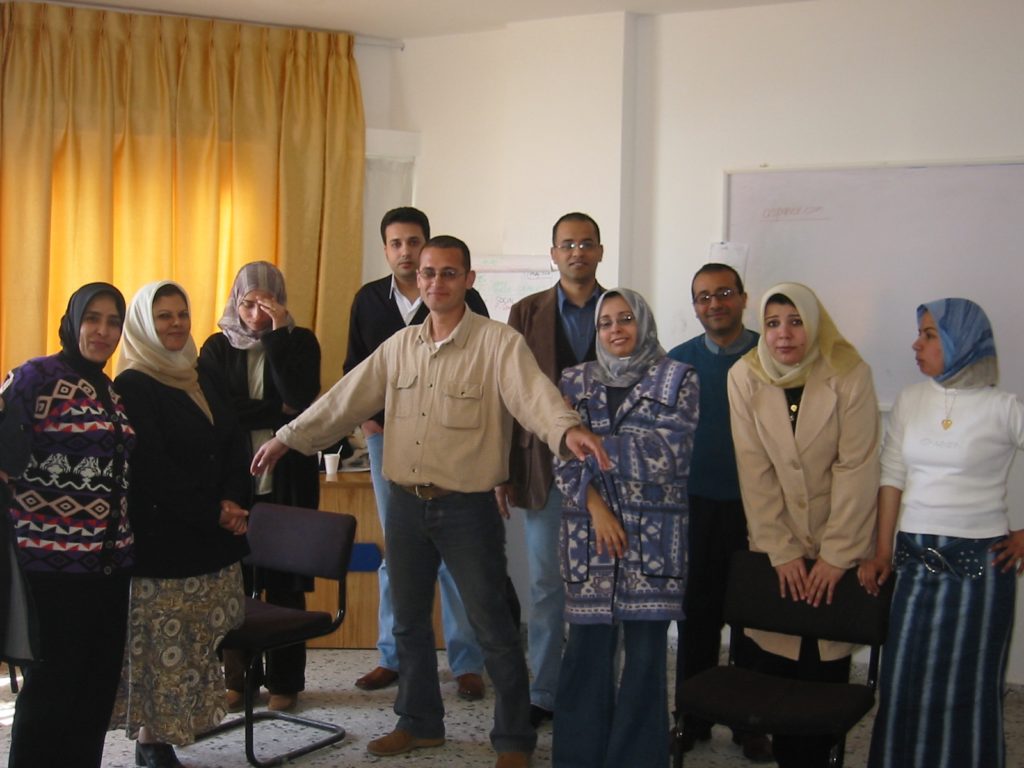
What can you tell me about the psychodrama group? Is this method supposed to be a tool for them to use in the future?
It is our desire and utopia. Give them a good training in psychodrama to multiply it. It takes years. It is a complicated method and the theory also limits. This group of 13 people who are going to graduate are eight women and five men. With them we have done four courses, each one on a full week. The first was in July last year (2003), then in April this year (2004), then in June and now in August.
This has been a therapeutic space for these people. They are doctors, psychiatrists, who constantly give support to others. They are traumatized. The advantage is that at the same time they are learning the method while they are in treatment. We have a plan to return next year, where we will accompany and supervise them in their respective action centers. They are going to play the role that I have right now.
Another very special group to which I am committed, as I mentioned to you before, are these women who are social workers. They are in the refugee camps. In addition to their struggle to survive, there is a struggle for cultural changes. This ranges from whether you want to put the veil to being able to choose who they want to marry.
All these colleagues have made a tremendous effort to become professionals. Many are not married. It is difficult to be both. This group of women who are fighters, heroines, smiling women and life bearers, is very interesting. They want to use this war situation for cultural changes as in Nicaragua with feminization, so that they can get out of the pre-established roles.
What is the situation of schools and universities?
It is a miracle! They work! I don’t know how! For example, in this training center where I work, it’s fantastic, because it has not dropped neither a bomb nor has there has been military attacks.
In Rafah’s camp, there are schools that are very close to where they build the wall. I get goosebumps, just think about it. You hear permanently the noises. You never know if they come to clean. That’s where we realize a wonderful factor of the human being. The ability to adapt. These children normally go, calmly, as if these noises did not exist. An important project that we are working on is to support teachers with psychodrama to make a counterweight to Hamas schools.
Another major international group that is working there, is one of women called “Women Empowerment Movement” or “Women’s Movement”. These women can sometimes travel to Europe. There is a lot of exchange and they also support teachers quite a bit.
We want to give this support thinking about the human, to strengthen the identities of these children, to tell them that weapons are not the only solution to their problems. We want to give them affection, tell them that there is not only hatred.
With psychodrama which is like a game, it is theater, it is fun, we want them to play roles, recreate and entertain themselves. It is playing with fantasy, because if there is something they cannot kill is imagination. They can drive people crazy, but they can’t take away their imagination.
For example, when we ask in the group, -what animal would you like to be?-, totally in a fantasy world, of course! Everyone wants to be birds. It represents freedom. Let’s be birds!
Here an interview with Hauser and complete report in this link from Schweizer Radio und Fernsehen (SRF) about her work.